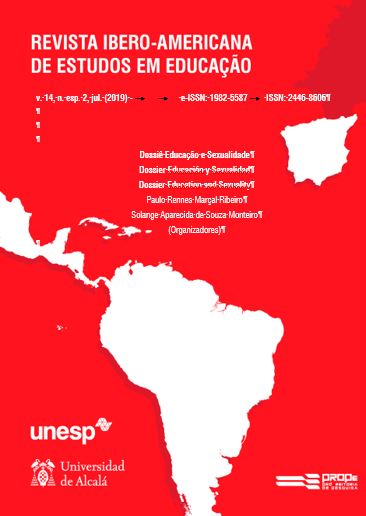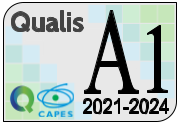Metodologias de ensino na educação em sexualidade: desafios para a formação contínua
DOI:
https://doi.org/10.21723/riaee.v14iesp.2.12614Palavras-chave:
Educação em sexualidade, Modelos de educação para a saúde, Metodologias de ensino, Portugal.Resumo
Nenhuma teoria ou modelo domina atualmente a investigação e prática na educação em sexualidade (ES) que, muitas vezes, é implementada sem qualquer referencial teórico. As diferentes metodologias de ensino aplicadas valorizam determinados constructos teóricos, usados de forma intencional, ou não, pelos/as professores/as quando recorrem a métodos e técnicas pedagógicos específicos. Assim, esta investigação visa compreender as práticas de professores/as para elaborar linhas orientadoras para a sua formação contínua em ES. Aplicou-se uma entrevista semiestruturada a um/a professor/a de cada Agrupamento de Escolas, numa amostra aleatória representativa do Distrito de Braga, Portugal (n=43). Observou-se que os temas/problemas abordados no ensino secundário, embora mais focados no pensamento crítico e na desconstrução de estereótipos relacionados com a sexualidade do que no 3º ciclo, continuavam também a incluir essencialmente com a falta de conhecimento sobre saúde reprodutiva. Os principais métodos aplicados, baseados no construtivismo e na aprendizagem ativa, eram os métodos expositivo ativo e de discussão. O cruzamento dos temas e metodologia utilizados permitiu inferir que a maior parte dos professores/as não usava um referencial teórico explícito, mas valorizava constructos da Teoria Social Cognitiva e Modelo Ecológico. Estes resultados mostram que é importante na formação de professores/as: aprofundar o conhecimento sobre os diferentes temas/problemas interdisciplinares da sexualidade humana e os modelos teóricos; refletir sobre a prática para melhorar o conhecimento pedagógico do conteúdo.Downloads
Referências
ALLEN, L. Closing sex education’s knowledge/practice gap: the reconceptualisation of young people’s sexual knowledge. Sex education, Oxford, v. 1, n. 2, p. 109-122, 2001.
BANDURA, A. Social Foundations of thought and action: A social cognitive theory. New Jersey: Prentice-Hall. 1986.
BARDIN, L. Análise de conteúdo. Lisboa: Edições 70, 2011.
BASS, J. E.; CONTANT, T. L.; CARIN, A. A. Methods for teaching science as inquiry (10th ed.). Upper Saddle River, NJ: Pearson Prentice Hall. 2008.
BISHOP, A. P.; BERTRAM, B. C.; LUNSFORD, K. J. et al. Supporting Community Inquiry with Digital Resources. Journal of Digital Information, Illinois, v. 5, n. 3, p. 2004.
BREWER T.; RIMER, K. Health behavior theories that focus on individuals. In: GLANZ, K.; RIMER, K.; VISWANATH, K. (Org.). Health Behavior and Health Education: Theory, Research and Practice. 4. ed. San Francisco: Jossey-Bass Pub. p. 149-165, 2008.
BROOKFIELD, S. D.; STEPHEN, P. Discussion as a Way of Teaching: Tools and Techniques for Democratic Classrooms, 2. ed. San Francisco: Jossey-Bass, 2005.
CASH, K.; KHAN, S. I.; NASREEN, H.; BHUIYA, A.; CHOWDHURY, S.; CHODHURY, M. R. Telling them their own stories: legitimizing sexual and reproductive health education in rural Bangladesh. Sex education, Oxford, v. 1, n. 1, p. 43-57, 2001.
DOUGLAS, N.; KEMP, S.; AGGLETON, P.; WARWICK, I. The role of external professionals in Education about sexual orientation – towards good practice. Sex education, Oxford, v. 1, n. 2, p. 149-162, 2001.
FREIMUTH, V. S. Theoretical foundations of AIDS Media Campaigns. In: EDGAR, T.; FITZPATRICK, M. A.; FREIMUTH, V. S. (Eds.). AIDS: A Communication Perspective. New Jersey: Lawrence Erlbaum Associates, p. 91-110, 1992.
GALL, M. D.; BORG, W. R.; GALL, J. P. Educational research: An introduction. London: Longman Publishers. 1996.
GLANZ, K.; LEWIS, F. M.; RIMER, B. K. Health Behavior and Health Education: Theory, Research and Practice,3. ed. San Francisco: Jossey-Bass Publishers. 2002.
GLANZ, K.; RIMER, B. K.; VISWANATH, K., Health Behavior and Health Education: Theory, Research and Practice, 4. ed. San Francisco: Jossey-Bass Publishers. 2008.
HALSTEAD, J. M.; REISS, M. J. Values in Sex Education: From principles to practice. London and New York: Routledg Falmer, Taylor & Francis Group. 2003.
HILTON, G. L. S. Sex education: the issues when working with boys. Sex Education, Oxford, v. 1, n. 1, p. 31-41, 2001.
HINGHAM, R. ‘We didn’t cover that at school’: education against pleasure or education for pleasure? Sex education, Oxford, v. 5, n. 4, p. 375-388, 2005.
JENSEN B. B. Participation, commitment and knowledge as components of pupil’s action competence. In: JENSEN, B. B.; SCHNACK, K.; SIMOVSKA, V. (Org.). Critical environmental and health education. Copenhagen: Research Centre for Environmental and Health Education, p. 219-237, 2000.
JENSEN, B. B. Health promoting schools in Denmark: an action competence approach to health education. In: CHU, C.; SIMPSON, K. R. (Org.). Ecological public health: from vision to practice. Canada: Institute of Applied Environmental Research, p.132-141, 1994.
JENSEN, B. B. A case of two paradigms within health education. Health Education Research, Oxford, v. 12, n. 4, p. 419-428, 1997.
JENSEN, B. B.; SCHNACK, K. Action competence as an educational challenge. In: JENSEN, B. B.; SCHNACK, K. (Org.). Action and action competence as key concepts in critical pedagogy. Copenhagen: Didaktiske Studier, p. 5-18, 1994.
JONES, B. F.; RASMUSSEN, C. M.; MOFFITT, M. C. Real-life problem solving: A collaborative approach to interdisciplinary learning. Washington DC: American Psychological Association. 1997.
JOYCE, B.; WEIL, M. Models of Teaching. Boston: Allyn & Bacon, 1996.
KIRSCHT, J. P.; JOSEPH, U. G. The health belief model: Some implications for behavior change with reference to homossexual males. In: MAYS, V.; ALBEE, G.W.; SCHNEIDER, S.F. (Eds.). Primary Prevention of AIDS: Psychological Approaches. Newbury Park: Sage, p. 111-127, 1989.
KOLB, D. A. Experiential learning: Experience as the source of learning and development (2nd. Edition). Saddle River, New Jersey: Pearson Edication, Inc. 2015.
KVALE, S. InterViews: an introduction to qualitative research interviewing. London: Sage Publications. 1996.
LÓPEZ, F.; FUERTES, A. Para Comprender La Sexualidad. Navarra: Editorial Verbo Divino. 1999.
MCALISTER, A. L.; PERRY, C. L.; PARCEL, G. S. How Individuals, environments, and Health behaviors interact. Social Cognitive Theory. In: GLANZ, K.; RIMER, B. K.; VISWANATH, K. (Org.). Health Behavior and Health Education: Theory, Research and Practice, 4. ed. San Francisco: Jossey-Bass Publishers, p. 169-188, 2008.
NATIONAL COMMITTEE ON SCIENCE EDUCATION STANDARDS AND ASSESSMENT, NATIONAL RESEARCH COUNCIL. National Science Education Standards. Washington, D.C.: National Academies Press. 1995.
PARSON, C.; STEARS, D.; THOMAS, C. United Kingdom – The eco-holistic model of the Health Promoting School. In: Jensen, B.B.; Simovska V. (Ed.). Models of promoting health schools in Europe. Copenhagen: EENHPS, WHO Regional Office for Europe, p. 64-66, 2002.
PATTON, M. Q. Qualitative evaluation and research methods. London: Sage Pub. 1990.
RODRIGUES, C. DE J.; VILAÇA, T. Educação em Sexualidade na Educação Moral e Religiosa Católica no 7º ano de escolaridade em Portugal. Revista Ibero-Americana de Estudos em Educação, Universidade Estadual Paulista Faculdade de Ciências e Letras - Araraquara, SP, v. 8, n. 3, p. 561-576, 2013.
SALLIS, F.; OWEN, N.; FISHER, B. Elological models of health behavior. In: GLANZ, K.; RIMER, K.; VISWANATH, K. (Org.). Health Behavior and Health Education: Theory, Research and Practice, 4. ed. San Francisco: Jossey-Bass Pub, p. 465-485, 2008.
SÁNCHEZ, F. L. La inocência rota: Abusos sexuales a menores. Barcelona: Oceano Grupo Editorial, S.A. 1999.
SÁNCHEZ, F. L. Modelos de intervenção em educação sexual. Comunicação apresentada no Seminário Educação Sexual nas Escolas – Desafios e responsabilidades, 14-16 Novembro 2002 na Associação para o Planeamento da Família (não publicada). 2002.
SHANKAR, P. R., Using Case Scenarios and Role Plays to Explore Issues of Human Sexuality. Education for Health, Wolters Kluer, India, v. 20, n. 3, p 1-5, 2008.
SILBERMAN, M. Active Training. A Handbook of techniques, Designs, and Tips, 3. ed. USA: Jossey-Bass/ Pfeiffer. 2006.
SILBERMAN, M.; AUERBACH, C. 101 Ways to make training active. USA: Jossey-Bass/ Pfeiffer. 1998.
SIMOVSKA, V.; JENSEN, B. B. Young-minds.net/lessons learnt: student participation, action and cross-cultural collaboration in a virtual classroom. Copenhagen: Danish University of Education Press, 2003.
SIMOVSKA, V.; JENSEN, B. B. Conceptualizing participation: the health of children and young people. Copenhagen: World Health Organization Regional Office for Europe, 2009.
SVINIVKI, M.; MCKEACHIE, W., et al. McKeachie’s Teaching Tips: Strategies, Research, and Theory for College and University Teachers, 13. ed. Belmont, USA: Wadsworth, Cengage Learning, 2011.
THARP, R. G.; GALLIMORE, R. Rousing minds to life: Teaching, learning, and schooling in social context. Cambridge: Cambridge University Press. 1988.
THOMAS, J. W.; MERGENDOLLER, J. R. Managing project-based learning: Principles from the field. Paper presented at the Annual Meeting of the American Educational Research Association, New Orleans. 2000.
VIGOTSKY, L. S. A construção do pensamento e da linguagem. São Paulo: Martins Fontes, 2000.
VILAÇA, T. Dos Modelos de Educação para a Saúde Tradicionais aos Modelos de Capacitação: Abordagens Metodológicas da Educação Sexual em Portugal do 7º ao 12º anos de Escolaridade. In: ENCIGA (Eds.). Actas do XX Congreso Associación dos Ensinantes de Ciências de Galicia. Sanxenxo: ENCIGA, p. 1-30, 2007.
VILAÇA, T. Development Dynamics of Action-Oriented Learning on Health Education. In: MUÑOZ M.; JELÍNEK I.; F. FERREIRA, (Org.). Proceedings of the IASK International Conference Teaching and Learning 2008. Aveiro: IASK- International Association for the Scientific Knowledge; Universidade de Aveiro, p. 74-83, 2008.
VILAÇA, T. Projecto de Educação sexual orientado para a ação e participação: efeitos nas escolas, professores, pais e alunos. In: CONGRESSO INTERNACIONAL SA.DE, CULTURA E SOCIEDADE, 3, 2008, Portalegre. Anais... Portalegre: Associação para a Investigação e Desenvolvimento Sócio-Cultural, p. 128-159, 2008.
VILAÇA, T. Percepções de professores/as sobre as diferenças de género na educação em sexualidade em escolas portuguesas. Educação: Teoria e Prática, Rio Claro - SP/ Brasil, v. 24, n. 45, p. 23-39, 2014.
VILAÇA, T. A multiple case study based on action-oriented sexuality education: Perspectives of Portuguese teachers. Health Education, SAGE Publishing – United Kingdom, v. 117, n. 1, p. 110-126, 2017.
VILAÇA, T; JENSEN, B. B. Applying the S-IVAC methodology in schools to explore students creativity to solve sexual health problems. In: MONTAN., M.; SALAZAR, J. (Org.). ATEE 2009 Annual Conference Proceedings. Brussels: ATEE Association for Teacher Education in Europe, p. 215-227, 2010
VILAÇA, T.; JENSEN, B. B. Aplicando a metodologia S – IVAC em escolas para explorar a criatividade dos alunos em resolver problemas de saúde sexual. Educação: Teoria e Prática, Rio Claro, v. 24, n. 45, p. 216-232, 2014.
WEARE, K. The health promoting school: an overview of concept, principles and strategies and the evidence for their effectiveness. In: EC; WHO EUROPE et al. (Ed.). First Workshop on Practice of Evaluation of the Health Promoting School: Models, experiences and perspectives. Switzerland: WHO EUROPE, p. 9-18, 1998.
Downloads
Publicado
Como Citar
Edição
Seção
Licença
Manuscritos aceitos e publicados são de propriedade dos autores com gestão da Ibero-American Journal of Studies in Education. É proibida a submissão total ou parcial do manuscrito a qualquer outro periódico. A responsabilidade pelo conteúdo dos artigos é exclusiva dos autores. A tradução para outro idioma é proibida sem a permissão por escrito do Editor ouvido pelo Comitê Editorial Científico.








